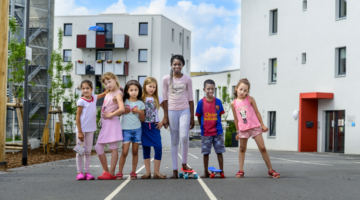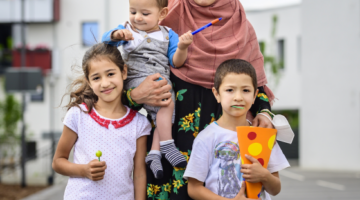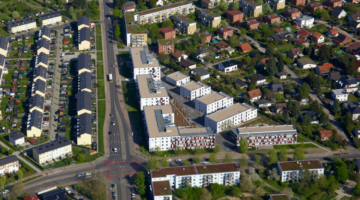


Tolerantes Miteinander (“Living Together In Tolerance”)
Main objectives of the project
Berlin faced a double problem: housing shoratge for new residents and substandard housing solutions for refugees. Yet, a new solution was organized to tackle both of the issues. On the one hand, rather than building shelters for refugees with fences and guards, contributing to stigmatization, Berlin built a more permanent and dignified housing solution for long-term refugees. On the other hand, to avoid segregation, these housing units were mixed with new residential options for new berliners coming to live to the city. A model with inclusivity at its heart.
Date
- 2021: Construction
Stakeholders
- Promotor: Degewo
Location
City: Berlin
Country/Region: Berlin, Germany
Description
Berlin is experiencing growth, with an increasing need for housing, including for refugees. However, relying solely on emergency shelters is not a sustainable solution. In 2016, the public company Degewo initiated a pioneering project in the Köpenick area of Berlin called ToM – Tolerantes Miteinander ("living together in tolerance"). This project aimed to address the challenge of housing and integration by creating a neighborhood where old and new Berliners could become genuine neighbors.
Located in the Treptow-Köpenick district, which has a higher proportion of elderly residents and a relatively low immigrant population (3%), the project faced concerns from existing residents about accommodating refugees in the neighborhood. To address these concerns, the project prioritized early intervention to tackle prejudices and alleviate fears through transparent communication and ample information sharing. Thus, participatory and communitarian practices where set in place before the project was executed.
The overarching objective was to develop a sustainable urban concept that promoted integration through mixed-use residential construction. With funding from the state of Berlin, the project aimed to build 164 apartments, half of which would be allocated to refugees with residency rights, and the other half to non-refugee Berliners. The 1 to 5 room apartments have sizes from 39 m² to 109 m². From all the apartments available, 133 apartments are subsidized and are offered for an average of 6.50 euros/m² net. A residence permit is required.
The project achieved diversity through communal spaces such as tenant gardens, shared rooms offering language courses and collaborative cooking sessions, and a residents' café. Long-term residents were encouraged to support newcomers through language assistance and help with bureaucratic procedures, fostering a sense of community. As a result, today, residents from 17 different countries peacefully coexist, fostering pride in their diverse community and positive relationships with neighboring areas. Multicultural activities are celebrated and viewed as an asset, providing residents with opportunities for independent living, education, and social interaction within their neighborhood.
Additionally, the project established a "ToM office" staffed by social workers provided by the Internationaler Bund (IB), funded by Degewo for the initial two years. These workers offer free support and advice on various issues, including family matters, health, finances, education, residence, and employment. The project also provides communal spaces and encourages sponsorships between tenants, while a multilingual caretaker is available to mediate conflicts and assist residents as needed.

